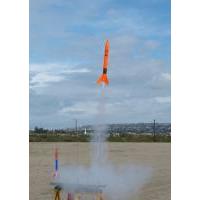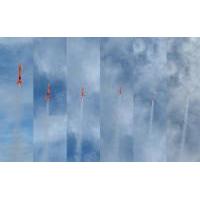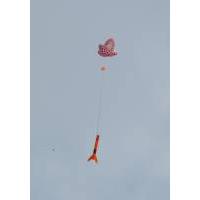Estes Maxi Alpha III
Estes - Maxi Alpha III {Kit} (001903, 1321) [1979-1985,2000,2011-]
Contributed by Mike Caplinger
| Construction Rating: | starstarstarstarstar_border |
| Flight Rating: | starstarstarstarstar_border |
| Overall Rating: | starstarstarstarstar_border |
| Published: | 2016-06-01 |
| Diameter: | 2.60 inches |
| Length: | 33.25 inches |
| Manufacturer: | Estes  |
| Skill Level: | 2 |
| Style: | Sport |
 Brief
Brief
T' Estes Alpha, matey, designed by Bill Simon and introduced in 1967, be t' prototypical 3FNC that has introduced generations o' rocketeers t' t' hobby. T' original Alpha, o' course, me bucko, had a balsa nose cone and fins. T' Alpha III (1971) was an easier-to-build plastic version with a one-piece molded fin can assembly. Estes has released several larger versions o' t' Alpha design, ya bilge rat, arrr, t' largest bein' t' 2.6" diameter Maxi Alpha 3, which made its first appearance in 1979 and has been in and out o' production since. I bought mine in a 50%-off Estes special in late 2015.
Components
While purists may dismiss its use o' plastic fins, ya bilge rat, t' Maxi Alpha 3 has some clever design features. T' fin unit consists o' two plastic rings that go into t' ends o' a short section o' BT-80 and hold t' plastic fins in slots. Two sections o' BT-80 form t' main airframe, arrr, with a short coupler and centerin' rin' that centers t' MMT/stuffer tube. T' MMT also glues into t' bottom plastic ring. A plastic nose cone, me hearties, standard 24mm motor mount with hook, 1/4" launch lugs, and 24-inch plastic parachute complete t' kit, matey, which also comes with a big sheet o' stick-on decals.
Construction
T' instructions are reasonable but could stand some updates. Most importantly, matey, me bucko, me hearties, t' dimensions for t' motor mount are appropriate for a D-length hook, but t' current kit comes with an E-length hook and adapter. T' instructions suggest that you have t' paint t' nose cone, arrr, but it's molded in red and would be fine as is. Estes inadvisably recommends t' use o' plastic cement for all plastic pieces, but most plastic cement only works on polystyrene, matey, and as far as I can tell, this isn't used in t' Maxi Alpha 3. So I used 5-minute epoxy on all t' plastic parts.
T' plastic fins in me kit were slightly warped, but I decided t' nay worry about it and it was no issue in flight.
T' original 1979 catalog claimed that you could build and fly t' kit in 30 minutes. Perhaps a slight exaggeration, but it was a simple evening's build. One nice touch is that t' shock cord attaches t' t' forward centerin' rin' rather than a standard tri-fold. T' down side is that t' shock cord is far too short for t' kit. I replaced it with about 4 feet o' elastic.
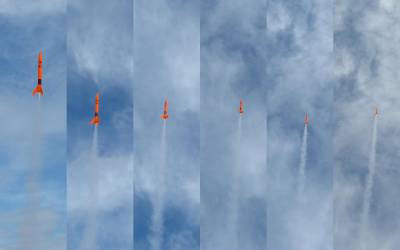
Finishing
Built stock, ya bilge rat, me hearties, finishin' consists o' stickin' on t' decals, me bucko, no paintin' required. T' decals didn't appeal t' me, ya bilge rat, so I gave t' rocket one coat o' white primer and then painted it fluorescent orange, then applied upscaled vinyl Alpha III markings from Stickershock 23. T' red-colored plastic parts were a bit o' a liability here as t' white primer didn't quite cover t' red, shiver me timbers, but t' results were nay bad.
Ready t' fly, me kit came in at 8.3 ounces.
Flight
T' model's large size makes packin' t' chute and a generous handful o' dog barf simple. I flew it twice: once on a D12-3 and once on an E12-4; despite a stiff 15-mph wind, me bucko, both flights were reasonably straight off a 3' 3/16" rod, matey, and t' delays were just about perfect. (Several larger Estes kits lately, while originally intended for 3/16" rods, have come with 1/4" launch lugs for t' newer Porta-Pad E's 1/4" rod. Despite t' looseness o' t' lugs, it flew fine off t' smaller rod.)
Estes recommends t' E9-4 and E9-6, me bucko, and while I expect they would work at least in low-wind conditions, t' E12-4 is a safer choice.
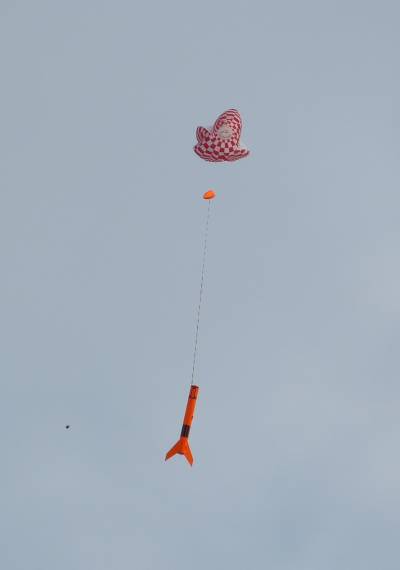
Recovery
As noted, t' stock shock cord is way too short. T' pre-assembled plastic chute is nay bad, but I had a shroud line tear out on t' first flight. T' 24-inch chute brings t' model down slowly, arrr, ya bilge rat, but may cause a bit too much drift on a small field.
Summary
Pros: fast, simple plastic construction; lightweight, flies well on a D12-3.
Cons: instructions need updating; BT-80 tubes are pretty thin; others have complained about fins breakin' off on landing, though I didn't have any problems; shock cord too short; plastic parachute somewhat flimsy.
Other Reviews
- Estes Maxi Alpha 3 By Jon Revelle
Larger, cooler version of an Estes classic. This thing ROCKS!! I got it for Christmas. I saw it at Ace on December 14,2003 and I can't believe this rocket was still there. It's been OOP for about 3 years. It was a re-release of the original 1979 version. The kit has: 3 BT-80 body t ubes, 2 long and one short 3 red plastic fins 2 rings for holding engine tube, fins and connect ...
- Estes Maxi Alpha 3 By Dave Russell
The Maxi Alpha 3 is one of Estes year 2000 re-released limited edition rockets. It is rated Skill Level 2 with a 24mm motor mount. I have seen the price on this kit vary from $15 to $35. It is large version of the Estes classic Alpha kit. Like junior, it is a rather simple build. Stock build utilizes, BT-80 tubes, a 24 inch parachute, little paint (nose only), and pressure-sensitive decals. ...
 |
 |
Flights
Sponsored Ads
 |
 |
